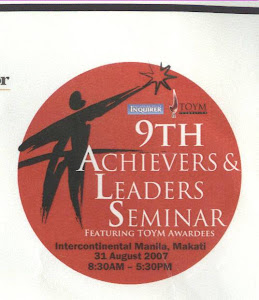Did you ever wish, as a parent, you had gifted children - children who could read even before he could go to school? or children who could play the violin like the Promil commercial? If you don't, or if you have not discovered yet that you do, read this blog. My eldest of 12 years old blurted last night that his teacher is a bully. This lunchtime his teacher told them in class(they're in section 7) that they will not pass the National Aptitude Test and therefore had to stay 5 more years in elementary. Goodness!!! But here's the study I was talking about before I talk to my son's teacher - or perhaps write their Principal.
In a ghetto area in the USA in the 1960s, a study about labeling of schoolchildren was conducted. The children's status from kindergarten up to Grade II was tracked down. Specifically, the teachers' practice of labeling its students was looked into. During kindergarten, the teacher placed its students in tables 1, 2 and 3. The placement was based on physical appearance, body odor, school language used, socioeconomic status and family size, and whether they were "fast" or "slow" learners.
Those in table 1 were the teacher's favorite - they were "fast" learners, were clean in appearance and odor, used standard American English, had high economic status and small family size. The farther the table, the "worse" the status. Amazingly, the children followed the way the teachers treated them. Those in table 1 were "respected." While those in table 2, and worse in table 3 had behavioral problems and low self-esteem.
There were 30 kindergarten students. This was reduced to 18 by the time the kids reached Grade 1. The teacher during this grade level followed a similar classification of the students and treated the students similar to the kindergarten teacher.
By the time the students reached Grade 2, there were only 10 of them.
You ask why? There's a theory we call Labeling. It says that labeling is a "self-fulfilling prophecy" - the more the kids are labeled "bad," the more they actually turn into "bad" kids. And unfortunately, the kids followed what the adult did. The worse part here is if the "bad' kid comes home to a non-ideal family.
The moral lesson? Be careful when you label children, or perhaps even adolescents and adults- they more likely become what we want them to become. So instead of destroying someone's life, try finding the "giftedness' of other people - be they young, not so young or old. Here in the Philippines, Ibon Foundation reported in 2004 that only 1/10 Filipino child is able to finish tertiary education.
Subscribe to:
Post Comments (Atom)
.jpg)

.jpg)
No comments:
Post a Comment